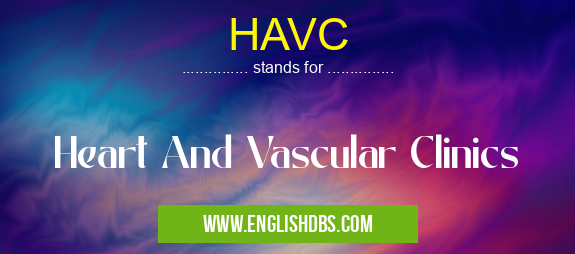What does HAVC mean in UNCLASSIFIED
HAVC is an abbreviation that stands for Heart And Vascular Clinics. These clinics specialize in the diagnosis and treatment of various heart and vascular conditions. HAVC clinics are staffed by experienced cardiovascular professionals, including cardiologists, vascular surgeons, and nurses. They offer a wide range of services, such as cardiac catheterization, angioplasty, stenting, and heart surgery.

HAVC meaning in Unclassified in Miscellaneous
HAVC mostly used in an acronym Unclassified in Category Miscellaneous that means Heart And Vascular Clinics
Shorthand: HAVC,
Full Form: Heart And Vascular Clinics
For more information of "Heart And Vascular Clinics", see the section below.
Services Offered by HAVC Clinics
- Cardiac catheterization
- Angioplasty
- Stenting
- Heart surgery
- Vascular surgery
- Electrophysiology studies
- Echocardiography
- Nuclear cardiology
- Peripheral artery disease treatment
- Venous disease treatment
Benefits of HAVC Clinics
- Comprehensive care: HAVC clinics offer a comprehensive range of cardiac and vascular services under one roof. This eliminates the need for patients to seek care from multiple providers.
- Experienced professionals: HAVC clinics are staffed by experienced cardiovascular professionals who are highly skilled in diagnosing and treating heart and vascular conditions.
- State-of-the-art technology: HAVC clinics are equipped with state-of-the-art technology for diagnosing and treating cardiac and vascular conditions. This technology allows for precise and effective treatment options.
- Patient-centered care: HAVC clinics focus on providing patient-centered care. They work closely with patients to develop personalized treatment plans that meet their individual needs.
Essential Questions and Answers on Heart And Vascular Clinics in "MISCELLANEOUS»UNFILED"
What is the importance of regular heart and vascular check-ups?
Regular heart and vascular check-ups are crucial for detecting and managing cardiovascular diseases, which are the leading cause of death globally. These check-ups allow healthcare professionals to assess your heart and blood vessel health, identify risk factors, and provide personalized recommendations to prevent or manage cardiovascular conditions. By identifying and addressing potential issues early on, regular check-ups can significantly improve your cardiovascular health and overall well-being.
What are the common symptoms of cardiovascular disease?
Common symptoms of cardiovascular disease may include chest pain, shortness of breath, fatigue, dizziness, or fainting. Other symptoms can vary depending on the specific condition, such as leg pain or numbness, neck pain, or difficulty breathing when lying down. It is important to note that some cardiovascular diseases may not present with noticeable symptoms, highlighting the importance of regular check-ups.
What are the risk factors for cardiovascular disease?
Major risk factors for cardiovascular disease include high blood pressure, high cholesterol, smoking, diabetes, obesity, physical inactivity, and a family history of heart disease. Certain lifestyle factors, such as an unhealthy diet, excessive alcohol consumption, and stress, can also contribute to an increased risk.
How can I reduce my risk of cardiovascular disease?
Implementing lifestyle modifications and managing underlying health conditions can effectively reduce your risk of cardiovascular disease. These measures include maintaining a healthy weight, engaging in regular physical activity, adopting a heart-healthy diet, quitting smoking, and managing blood pressure and cholesterol levels. Additionally, controlling diabetes and reducing stress can further contribute to cardiovascular health.
What are the treatment options for cardiovascular disease?
Treatment options for cardiovascular disease vary depending on the specific condition and its severity. Treatment may involve lifestyle modifications, medications, procedures such as angioplasty or stenting, or even surgery. Your healthcare professional will determine the most appropriate treatment plan based on your individual needs and circumstances.
Final Words: HAVC clinics play a vital role in providing specialized care for patients with heart and vascular conditions. These clinics offer a comprehensive range of services, experienced professionals, state-of-the-art technology, and patient-centered care. By choosing a HAVC clinic, patients can receive the highest quality of care for their cardiac and vascular health needs.
HAVC also stands for: |
|
| All stands for HAVC |
